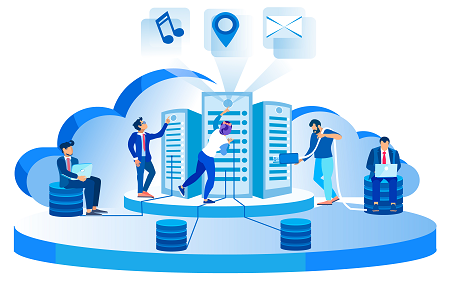Salient IT Services › Data backup services Yuba City
What you need to know about data backup services in Yuba City
For many modern businesses, data is as essential to their operations as basic utilities such as electricity (and, these days) internet. This means that any interruption to the supply of data could lead to a costly loss of productivity for their business. Fortunately, it’s easy and affordable to protect against this with a little strategic planning. With that in mind, here is what you need to know about data backup services in Yuba City.
Data backups are essentially insurance policies and you need the right level of cover
The long-standing rule of thumb is known as the 3-2-1 strategy. That’s three copies of your data (including your production data) over two media (including cloud platforms), with one copy kept off-site (in a secondary cloud). This is generally the right level of cover for most businesses. Your local back-up will mostly be used to deal with local errors (like accidental deletions) and your off-site copy will mostly be used for disaster-recovery scenarios.
There is nothing to stop you from taking extra data back-ups, but it’s advisable to consider what you would gain by this and whether the advantage would be enough to set off the extra costs and risks. Remember that data backups (and data archives) are subject to the same legal/compliance requirements as production data, so they need the same degree of protection.
Realistically, therefore, it’s probably best to resist the temptation to “stockpile” data backups and trust in a robust disaster recovery strategy, especially if you’re using the cloud which facilitates remote operations.
Your off-site data backup should almost always be held in a cloud
Your local data backup will be stored in your local environment. For most SMBs that will be the cloud anyway, but, in principle, it could still be a data center. Your off-site data backup, however, should almost always be stored in a (different) cloud. There are several reasons for this, but most of them revolve around the fact that this allows you to recover remotely and hence quickly.
This then raises the question of whether to use a public cloud or a private cloud. If you’re operating a data center or in the public cloud already, then the answer is almost certainly the public cloud, albeit for slightly different reasons.
If you’re in a data center, then your disaster recovery solution is probably going to be a second data center, in which case all you want is a way to hold your data backups safely and get them from A to B without having to worry about safely transporting physical media. If you’re in a public cloud, by contrast, then taking the data backups you need to another public cloud lays the foundations of a cost-effective disaster recovery solution. You just need to add the tools required to manipulate the data, for example, an operating system and applications.

If you’re in a private cloud, however, then you have various options open to you. Firstly, you could set up a second private cloud to act as a disaster recovery solution and just store your regular data backups to it. This makes for the simplest architecture and minimizes downtime in a disaster scenario, but all this convenience comes at a cost.
Secondly, you could set up a second private cloud to act as a disaster recovery solution, but store your regular data backups in a public cloud (which is generally fine, even if they contain sensitive data, as long as they’re encrypted). You’d then have to string the three clouds together so that data could travel from one to the other and back again, so you could resync everything after a disaster event. This is more complicated and can make for slower recoveries in the event of a disaster, but it can be a lot more cost-effective.
Thirdly, you could potentially just use a public cloud as both a place to store your data backups and a disaster recovery solution. This option may not be open to everyone, at least not at present, but the mainstream cloud platforms are working hard at making themselves compliant with the major data protection laws and compliance programs, so it could be an option already and if not it may become one soon.
You might not be comfortable with the idea of trusting the public cloud all the time, but you might consider the idea of storing your regular data backups in them in encrypted form and only decrypting them in the public cloud if you needed to activate a disaster recovery plan.
If you’d like to speak to a reputable and experienced data backup services provider in Yuba City, please click here now to contact Salient IT.


 (3 votes, average: 3.67 out of 5)
(3 votes, average: 3.67 out of 5)
